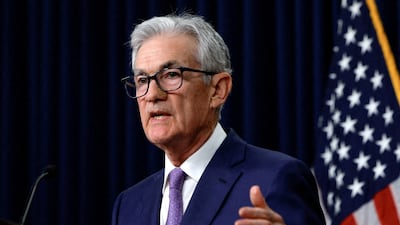Traders across global financial markets will be glued to their screens on Friday when Federal Reserve chairman Jerome Powell is set to deliver a speech as the US central bank moves closer to cutting interest rates.
Mr Powell will deliver the keynote address at the Jackson Hole symposium in Wyoming, an annual gathering of Federal Reserve officials, other central bankers, financial organisations and academics to discuss long-term policy issues.
This year's theme is Reassessing the Effectiveness and Transmission of Monetary Policy, which will explore lessons learnt from the monetary policy response to the Covid-19 pandemic and the 2022 global surge in inflation.
“At Jackson Hole, I try to take a step back, or move to a higher level, and try to say things that have a little more generality to them and see what can we learn,” Mr Powell said at the Economic Club in Washington last month.
While no announcement on interest rates is expected, markets will be eager to hear from Mr Powell as the Fed edges closer to cutting rates for the first time since the pandemic. It has held its target range at 5.25 to 5.50 per cent since last July after aggressively raising rates in response to the US surge in inflation.
The Fed's year-plus wait on cutting rates has also meant that most central banks in the GCC, whose currencies are pegged to the US dollar, have also had to hold off on cutting interest rates.
Other advanced economies have already moved towards cutting rates. The Bank of England cut rates in August, while the European Central Bank began in June. Central banks in Sweden and Switzerland have also eased monetary policy. Mr Powell has already telegraphed a September rate cut, which markets have priced in.
US economic health
Mr Powell will speak as concerns grow about the health of the US economy, namely in the jobs market.
A monthly jobs report released two days after the Fed's July 30-31 meeting initially sparked fears of a recession as the unemployment rate unexpectedly rose from 4.1 per cent to 4.3 per cent, bringing about a period of volatility in equity markets. Those fears have since subsided.
Minutes released from that meeting on Wednesday showed some officials had seen the case for a rate cut then, with several saying a “gradual easing in labour market conditions could transition to a more serious deterioration”.
“If Powell is upbeat about the economy, this would reinforce the increasingly prevailing view that the US is likely to avoid a recession, which has triggered the recent recovery in equity markets,” Mahmoud Alkudsi, senior market analyst at ADSS, wrote to clients.
As Fed officials see the downside risks to employment as having increased, they see a decrease in the upside risks to inflation.
On Thursday, Philadelphia Fed president Patrick Harker was the latest Fed official to publicly voice his support behind a September rate cut.
"In September we need to start a process of moving rates down," he told CNBC, noting rates need to be brought down "methodically".
But holdouts still remain, with Kansas City Fed president Jeffrey Schmid telling Bloomberg TV he still is not ready to support a rate cut.
Easing inflation
For much of this year, the Fed has pushed back against moving to cut rates too soon, fearing that doing so would lead to an increase in inflation. Mr Powell defended the Fed's cautious approach after a bumpy first quarter. Since then, inflation has eased considerably.
The Personal Consumption Expenditures Price Index, the Fed's preferred inflation metric, has fallen to 2.5 per cent year-on-year, only 50 basis points off the Fed's long-term 2 per cent aim. A softer-than-expected Consumer Price Index report in June seemed to reaffirm this downwards path, amplifying rate-cut hopes. Mr Powell has said the Fed would cut interest rates before inflation falls to 2 per cent.


